When two planes flew into the World Trade Center on September 11, 2001, the world stood in solidarity with the United States. In London, “The Star-Spangled Banner” was played at Buckingham Palace. “We are all Americans,” declared Le Monde. In Berlin, 200,000 people took to the streets to express their sorrow. This makes it all the more striking how different — and how morally obtuse — the reaction to Hamas’s slaughter of around 1,400 Israelis has been.
Major news outlets were strangely reluctant to dwell on the horror before jumping straight to the Israeli response. Instead of declaring that we are all Israelis, Le Monde editorials fulminated against Israel’s “desire for vengeance.”And when huge demonstrations filled the streets of Berlin, London, Paris and Brussels, they were not in solidarity with those who’d been brutally murdered, but in support of the terrorists.
Was this an expression of a desire to protect Palestinian civilians from the likely Israeli reaction? Were those on the steps of Melbourne’s state parliament or rallying outside the US Consulate General in Toronto speaking up for the dispossessed? Were the protests in Cairo and Islamabad concerned with the plight of fellow Muslims?
In the past three decades, the nature of the left has fundamentally changed
That is the most charitable interpretation. And it is beyond doubt that the conflict provoked by Hamas’s gruesome attack has, in turn, claimed the lives of many innocent Palestinian civilians. But if that is the demonstrators’ true motivation, where were the throngs of people mourning the hundreds of thousands of Shias (or, for that matter, 3,000 Palestinians) murdered by Bashar Assad in Syria? Where are the mass protests about the millions of Uighurs oppressed by the Chinese government in Xinjiang? Why did no one seem to care when, only last month, Azeri forces expelled 100,000 Armenians from Nagorno-Karabakh?
The simple, sobering truth is that the international left has barely paid attention to any of those conflicts. Instead, it has reserved its rage for the actions of the only state in the world that happens to be Jewish.
What explains the difference between the reactions to 9/11 and 10/7? Part of the reason is the genuine complexity of the Middle East conflict. Given its long and intricate history, people can honestly come to different conclusions about who is to blame for why a lasting peace now feels so desperately out of reach. There need be nothing anti-Semitic about criticisms of Israeli governments, the current one very much included.
But many journalists and ordinary citizens seem to have allowed their awareness of the moral complexity to translate into an unwillingness to accept that particular episodes within the conflict may nevertheless be crystal clear. Reasonable people can have serious disagreements about many questions regarding Israel and Palestine. But they should not have serious disagreements about whether the cold-blooded slaughter of 1,400 people — some of them babies or grandmothers, and many so mutilated as to be unrecognizable — is justifiable.

This lack of the very “moral clarity” that many journalists have agitated for over past years can help to explain some of the media’s failures — such as the shamefully erroneous reporting of the tragic explosion at al-Ahli Hospital. But it is hard to suppress the suspicion that, especially on the left, another factor is at work: a bias rooted in the demands of an increasingly influential ideology. To understand how such big swaths of the left could have ended up reluctant to condemn Hamas at best, and outright celebrating its murderous spree at worst, we need to understand the rise of a new set of ideas that put simplistic identity categories at the center of how to see the world — and end up distorting our ability to comprehend it.
In the past three decades, the nature of the left has fundamentally changed. For much of the twentieth century, it was universalist. While the record of communism tended to be one of repression and mass murder, the promise of the left was for people to stand in solidarity: Jew with gentile, black with white. The most famous communist exhortation was for the workers of the world to unite — not for them to form racially segregated affinity groups.
But when the promised revolutions didn’t materialize, a section of the left became disenchanted with the notion of equality. Instead, they adopted a focus on categories of ascriptive identity: gender, race, sexuality and more. They came to believe that progress is possible only if how we treat each other — and how the state treats us — depends explicitly on the groups into which we are born.
In my new book, The Identity Trap, I trace the intellectual origins of these ideas and how they have reshaped the culture and politics of many western democracies. What I call the “identity synthesis” goes a long way to explaining the transformation of the rules and practices governing much of life in the US. It can also help us to understand why the left, driven by supposed support for the underdog, has proved so unwilling to condemn Hamas.
The left — and, increasingly, parts of the mainstream — has embraced a very specific definition of racism that blinds people to injustices against any group that is perceived to be dominant. It divides the world into simplistic categories of oppressors and oppressed, of whites and people of color, of colonizers and the colonized — and then concludes that any kind of cruelty is justified on behalf of the marginalized. And it claims that all the injustices in the world are somehow linked, giving every activist a moral obligation unquestioningly to support all of the left’s most fashionable causes.
These strains of thought account for why some protestors believe that “reproductive rights means a free Palestine;” how the Chicago chapter of Black Lives Matter tweeted a hagiographic picture of the paragliders who murdered more than 260 people at a festival in southern Israel; and why dozens of student groups at Harvard could assign Israel the “entire” responsibility for the worst murder of Jewish civilians since the Holocaust.
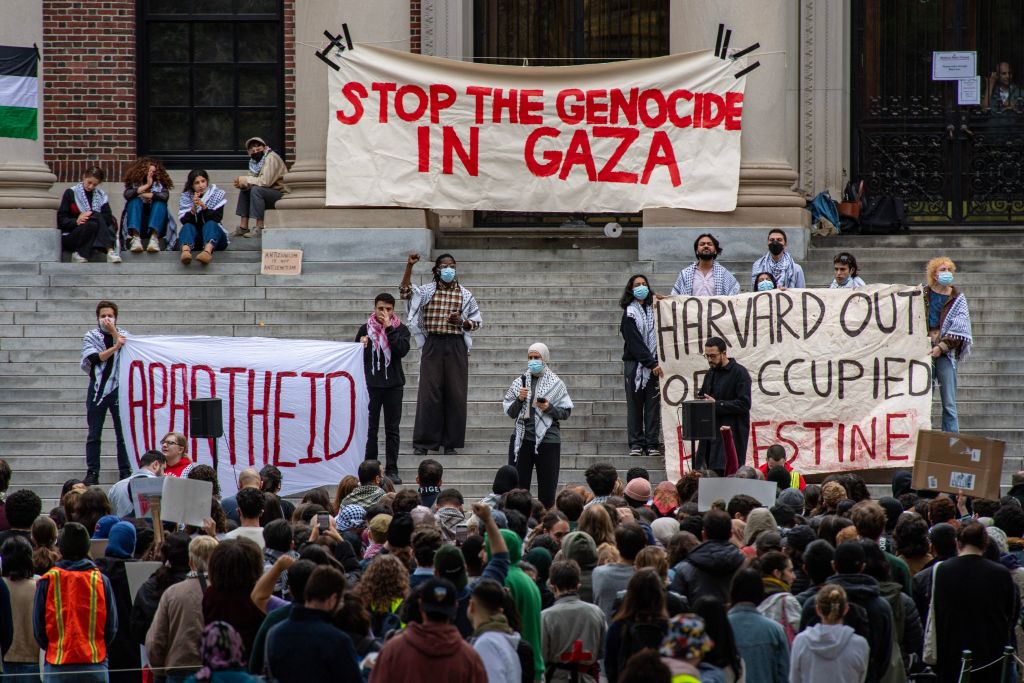
In other words, to understand why so many struggle to believe that Jews can be the victims of discrimination or terrorism, we need to know how the meaning of racism has changed. In the classic definition, somebody is a racist when they believe that members of a particular racial group are morally or intellectually inferior. The same, by extension, is true of a collective entity or institution that endorses such beliefs.
This conception of racism allows us to understand important things about the world. But as social scientists have pointed out, members of disfavored racial groups can, under certain circumstances, experience serious disadvantages even though nobody involved holds deprecating views about them. The traditional example — now somewhat outdated due to the rise of services like Uber — concerned a black person who is trying to hail a cab in the streets of New York. If most taxi drivers (rightly) believed that this passenger is more likely to live in a poor neighborhood, they would have feared that it would be harder to pick up another fare at the end of the trip. Even if most cabbies did not hold bigoted beliefs, they might still discriminate against black passengers.
Social scientists coined the term “structural racism” to describe this phenomenon, and it is a useful addition to our conceptual apparatus for understanding the world.
But in recent years, substantial parts of the left have gone one step further. Rather than adding to our conceptual apparatus by recognizing that both individual and structural racism exist, they insist that the correct definition of racism is exclusively structural. As Vice magazine put it in a recent article: “It’s literally impossible to be racist to a white person.”
It is not possible to press Israelis and Palestinians into a simple schema of good and evil
This, by contrast, makes it impossible to understand many aspects of the world. It mistakenly suggests that people in supposedly dominant groups can never experience any form of racism — making it harder to realize that members of any and all groups, whether white or black, Christian or Muslim, supposedly dominant or supposedly marginalized, are capable of being consumed by racial hatred. And such wilful blindness has turned out to be especially pernicious because, even though in the US Jews are far more likely on a per capita basis to experience hate crimes than other ethnic or religious groups, the identity synthesis ensures that they are wrongly coded as white.
In America’s racial discourse, the world is split into two categories: “whites” and “people of color.” According to this view, whites are members of a privileged group that has historically oppressed minorities and people of color are members of marginalized groups that are by definition incapable of committing racist acts.
The problem with this view is that it fails to make sense of a huge variety of political conflicts. It does not, for example, contain the conceptual resources to capture what is going on when one non-white group oppresses another — as the Chinese government is now doing in Xinjiang. And the failure becomes even more acute when the victims of racial hatred are considered to be white.
Six million European Jews were exterminated because they were not considered part of the majority ethnic group. Racial prejudice against Jews limited their opportunities in virtually every country where they lived, including the US, for centuries. Many Jews in Israel today, having recent roots in the Middle East, do not have lighter skin than Palestinians. A sizable minority are black, having immigrated from Ethiopia and Eritrea. Among those slaughtered on October 7, thirty were migrant Thai workers. (Another seventeen are missing.)
But none of this seems to matter. In the imagination of the global left, Jews are “white” and Palestinians “people of color.” By this logic, Palestinians are incapable of being racist towards Jews.
Little wonder, then, that mainstream institutions end up being blind to racism directed at Jews. In the past days, many New York Times stories about Gaza were written by a freelancer who has repeatedly praised Adolf Hitler on social media. When Karine Jean-Pierre, the White House press secretary, was asked about a potential rise in antisemitism in America, she answered by claiming that “Muslims and those perceived to be Muslim have endured a disproportionate number of hate-fueled attacks.”
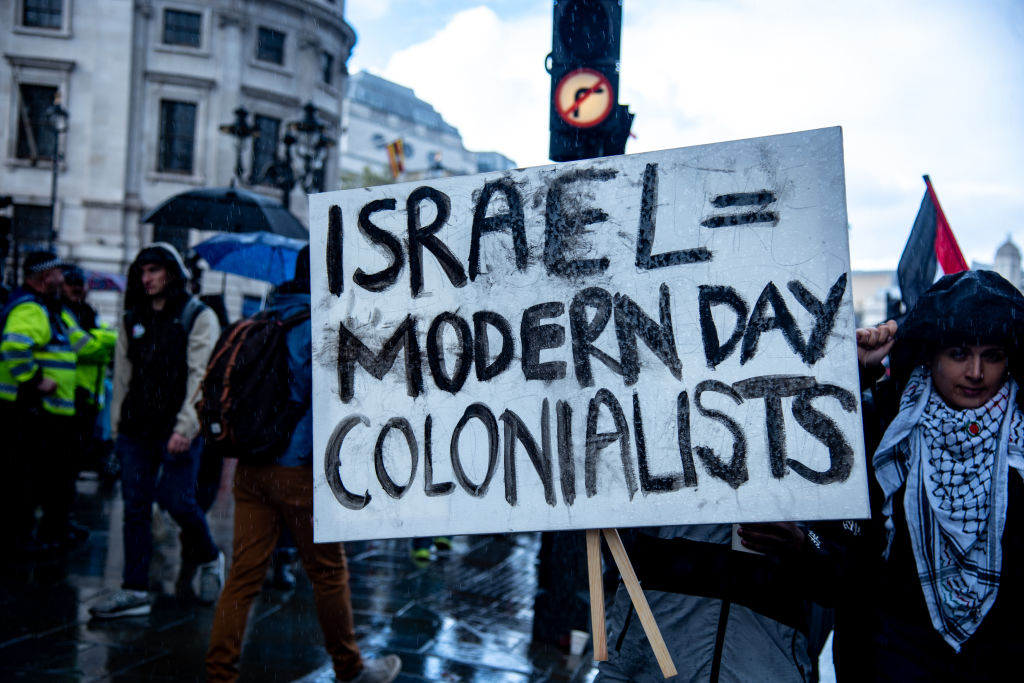
We can expect these dynamics to become more inflamed in the coming weeks and months. More than 1,700 sociologists in the US, Britain and beyond recently signed a letter expressing their solidarity with Gaza. They did not condemn Hamas’s terror attack. Nor did they acknowledge the plight of the 220 hostages. Instead, they emphasized the need to “contextualize this past week’s violence in the context of seventy-five years of settler colonial occupation and European empire.”
The claim that Israel is a European power engaged in “settler colonialism” has become a ubiquitous part of the rhetoric against the Jewish state. But like the claim that the conflict pits whites against people of color, it fundamentally warps the issue at hand. In fact, the idea that Israel is a settler colony in the way that America once was is doubly distorting.
For one thing, Jews trace their origins back to Israel. They have been present in the region for thousands of years. Far from being analogous to the English who set sail for a supposedly virgin continent, they — like the Palestinians — have a strong claim to being indigenous inhabitants of the area.
For another, the description of Israel as a “European” project fails to grapple with the country’s present-day demographic composition. After all, millions of Israeli Jews are Mizrahi rather than Ashkenazi. They are descendants of people who have, over the course of the last three quarters of a century, been violently expelled from Middle Eastern countries, had nowhere else to turn, and would today be neither safe nor welcome if they sought to return. There is also the fact that 21 percent of Israel’s population are Arabs — many of whom were also murdered by Hamas on October 7.
There is a bitter irony to all of this. The progressive left claims to be fighting colonialism. And yet it is so uninterested in the reality of non-western countries that it winds up blindly imposing conceptual categories that were forged in the context of American history and society on the rest of the world. The identity synthesis may be dressed up in postcolonial clothes; but it is itself a neo-colonial enterprise.
There is one final factor in how these moral errors could come to be so influential: the concept of intersectionality. Originally coined by the academic and campaigner Kimberlé Crenshaw, the idea of “intersectionality” says that various forms of disadvantage can reinforce each other: that, for instance, the discrimination suffered by black women can, in some contexts, be more than the arithmetic sum of the discrimination suffered by white women on the one hand, and black men on the other.
That is true so far as it goes. But Crenshaw’s theory quickly took on a life of its own. If people can face disadvantage based on belonging to more than one identity group, activists claimed, then the only way to liberate them would be to fight against all those forms of disadvantage at the same time. These activists came to see every type of oppression as linked — and to demand that anyone who cares about one kind of injustice must simultaneously fight against all other kinds.
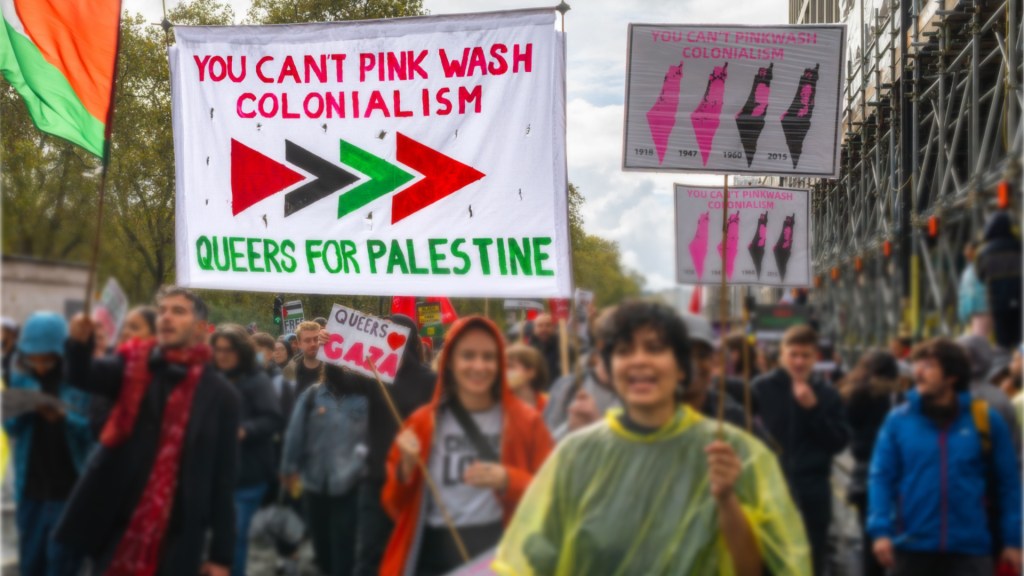
Many people have, in the past weeks, been surprised by how many protests held banners like “Queers for Palestine.” After all, Israel has an excellent record at respecting gay rights, while the authorities in Gaza heavily penalize homosexuality. But the logic of intersectionality helps to explain why, at a sufficiently high level of abstraction, these causes can appear to be at one with each other. Since they see both sexual minorities and Palestinians as oppressed, intersectional activists posit that the fates of both groups must be inextricably linked.
As a broader and bloodier conflict looms on the horizon in the Middle East, it is time for a simple willingness to recognize the messiness of the real world. The idea that all supposed victims of oppression do, or should, see each other as allies is fanciful. Neither Israelis or Palestinians have a monopoly on moral virtue. It is not possible to press them into a simple schema of white or black, colonizer or colonized, good or evil. The murder of 1,400 innocents in Israel has already provoked a broader conflict in which a lot more innocents are likely to perish.
It is not possible, either, to expect any state to tolerate the cold-blooded murder of so many citizens without doing what it takes to re-establish its security. Nor would any other state accept talk of a ceasefire while hundreds of its people remain in the clutches of a brutal terrorist group. But that does not mean that it would be wise for Israel to stumble into a wider regional war — nor does it absolve the country from its moral responsibility to do what it can to protect the lives of civilians on the “other” side. How to balance these imperatives without abandoning any of them is a fiendishly difficult task.
While the future of the conflict remains unclear, its first weeks do already offer one clear lesson. Nobody, neither Israeli or Palestinian, forfeits their humanity by virtue of the group into which they are born. And an ideology that is incapable of recognizing that basic fact loses any claim to moral superiority.
This article was originally published in The Spectator’s UK magazine. Subscribe to the World edition here.



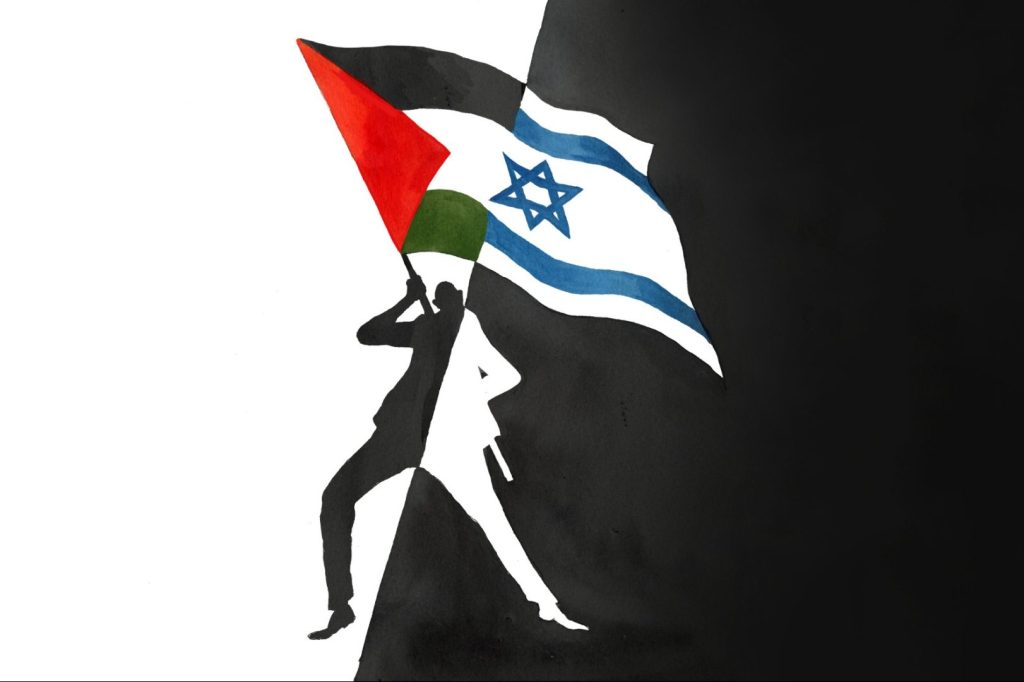











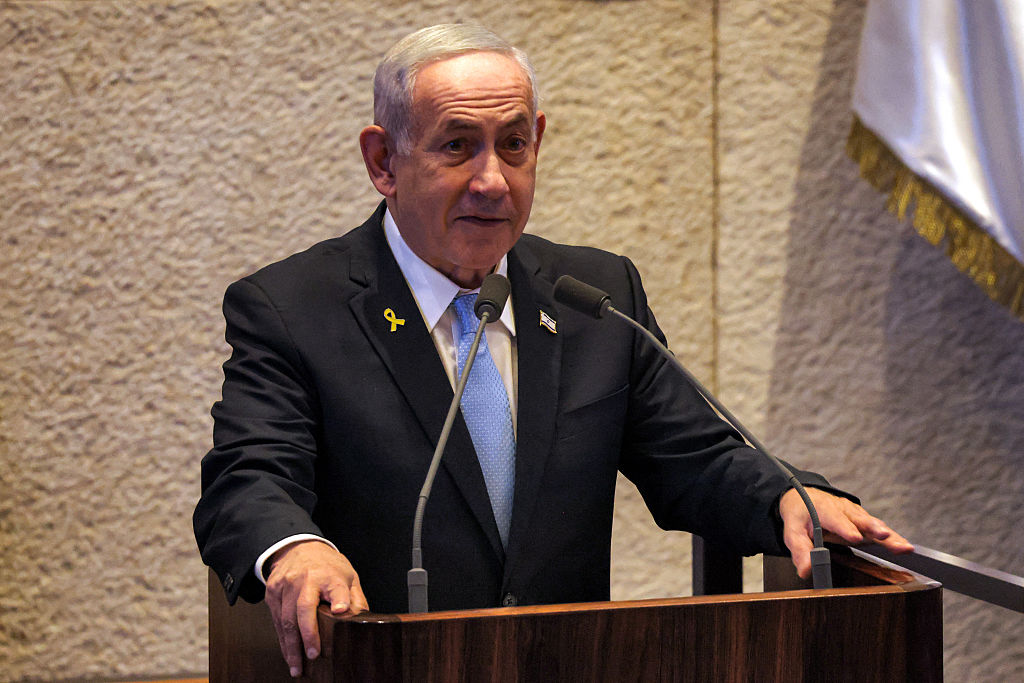
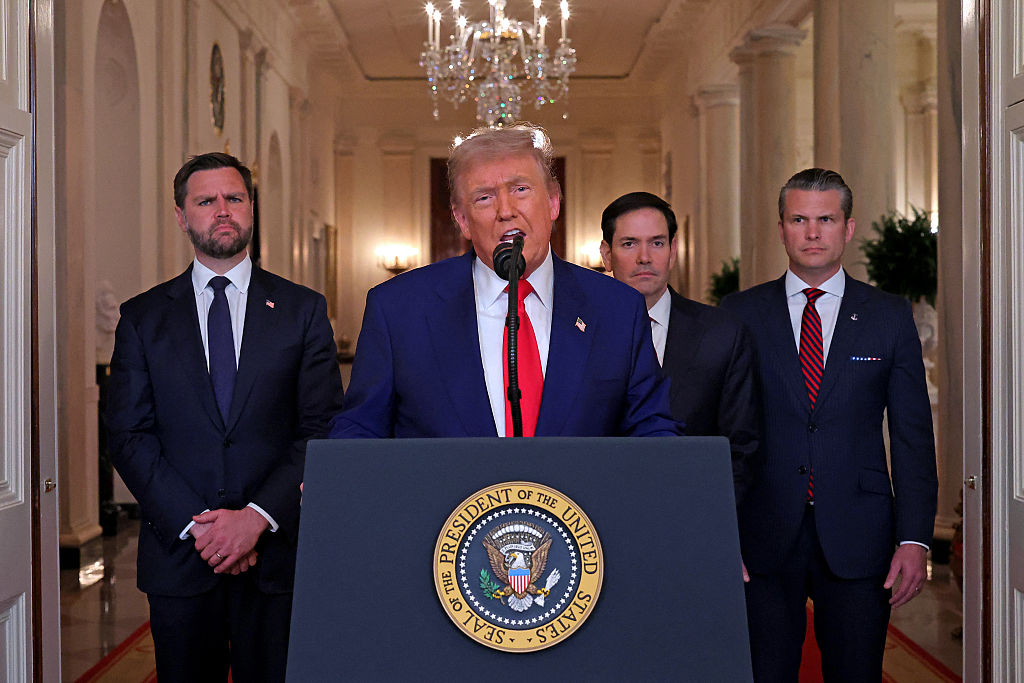









Leave a Reply